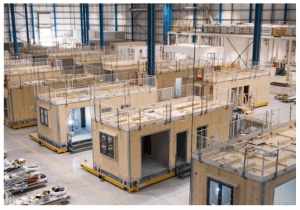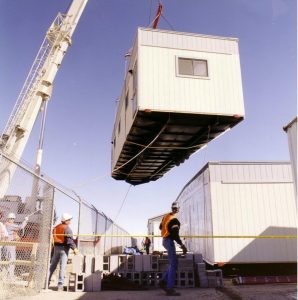In recent years, the construction industry has witnessed a significant shift towards sustainable practices. As the world becomes more conscious of environmental impact, builders and developers are embracing innovative solutions to reduce carbon footprints and enhance efficiency.
One such solution that has gained traction is the use of modular construction techniques in mixed-use developments. This article explores the benefits of sustainable design and efficiency unlocked by this approach, along with key takeaways for developers and builders.

The Rise of Modular Construction
Modular construction involves the production of building components or entire sections off-site, which are then transported to the construction site for assembly. This process offers numerous advantages over traditional construction methods, making it an ideal choice for mixed-use developments focused on sustainability.
-
Speed and Efficiency: Modular construction significantly reduce construction timelines. According to industry studies, this innovative technique can cut construction time by up to 50%. This speed allows developers to complete projects faster and generate returns on investment more quickly.
-
Cost Savings: The controlled environment of factory-based production ensures fewer delays due to weather or other external factors. This efficiency leads to cost savings, as fewer labor hours are required for on-site construction. Industry statistics show that cost savings can range from 20% to 50% compared to traditional construction methods.
-
Sustainable Materials and Practices: Modular construction also contribute to sustainable development. The use of renewable materials, such as wood, reduces the embodied energy of the building while capturing carbon dioxide. Additionally, the controlled manufacturing process minimizes waste and optimizes material use, further reducing environmental impact.
-
Design Flexibility: Contrary to common misconceptions, and modular construction does not compromise design flexibility. In fact, this approach offers a wide range of customizable options, allowing architects and developers to create unique and aesthetically pleasing structures. Innovations in modular design have even led to award-winning projects around the world.
The Benefits of Modular Construction in Mixed-Use Developments

Mixed-use developments provide an ideal setting for leveraging the advantages of modular construction. These types of projects combine residential, commercial, and often recreational spaces in a single development, promoting efficient land use and reducing the need for long commutes. By incorporating sustainable design and efficient construction methods, developers can amplify the benefits further.
Energy Efficiency: Modular construction can incorporate energy-efficient features seamlessly. From insulation and air sealing to high-performance windows and renewable energy systems, these structures can significantly reduce energy consumption and lower carbon emissions. Energy-efficient mixed-use developments not only offer cost savings but also align with global efforts to combat climate change.
Community Integration: Sustainable mixed-use developments often prioritize connectivity and community integration. Modular construction techniques allow for faster project completion, enabling communities to reap the benefits sooner. By integrating attractive, environmentally friendly spaces, developers can create vibrant communities that promote social interaction and well-being.
Scalability: Modules are typically designed to be easily scalable. This adaptability allows for future expansion or modification based on evolving needs. Mixed-use developments can adapt to changing market demands, ensuring long-term viability and sustainability of the project.
Reduced Disruption: On-site construction often leads to inconveniences for surrounding communities. However, with modular construction, noise, dust, and other disruptions are significantly minimized. This benefit not only improves the experience of users but also contributes to better community relations.
Key Takeaways for Developers and Builders
Sustainable design and efficiency unlocked by modular construction in mixed-use developments present significant opportunities for developers and builders. To make the most of this approach, consider the following key takeaways:
Collaboration is crucial: Engage experienced architects, engineers, and modular construction specialists to ensure seamless collaboration and successful project delivery.
Planning for sustainability: Incorporate sustainable design principles from the early stages of development to maximize energy efficiency and minimize environmental impact.
Stay informed about industry trends: Continuously keep up with innovations, best practices, and regulations related to sustainable modular construction to stay ahead in this rapidly evolving field.
Market differentiation: Leverage the environmental and efficiency benefits of modular construction as a unique selling point for attracting eco-conscious investors and tenants to your mixed-use developments.
In conclusion, the use of modular construction techniques in mixed-use developments offers a sustainable and efficient solution to meet the growing demand for environmentally friendly buildings. Developers and builders who embrace this approach stand to gain not only cost savings and faster project completion but also contribute to a greener and more sustainable future.
Source: https://utilitiesone.com/prefab-and-modular-construction-a-sustainable-approach-to-mixed-use-developments
